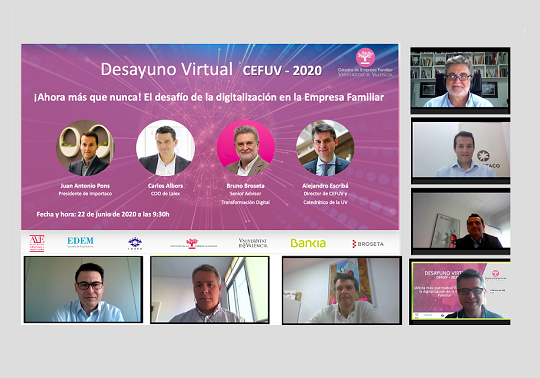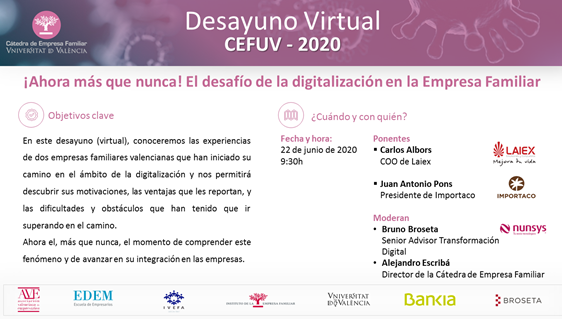
On Monday, June 22th, the Family Business' Chair at the University of Valencia (CEFUV) promoted by the Valencian Association of Entrepreneurs (AVE), 'Escuela de Empresarios' (EDEM), the Valencian Institute for Family Business' study (IVEFA) and the Family Business Institute (IEF), currently sponsored by BANKIA y BROSETA ABOGADOS, has held a 'Virtual Breakfast' covering a thriving topic these days: "Now more than ever! The challenge of digitization in Family Businesses". The breakfast had Carlos Albors (COO at Laiex) an Juan Antonio Pons (President Importaco) as speakers and was moderated by Alejandro Escribá (Director of CEFUV) an Bruno Broseta (Senior Advisor of Digital Transformation at Nunsys).
Digitization and virtual technologies are a key phenomenon in the transformation of business reality on recent years, showing great potential for improving processes and activities. This is especially important for the present and future competitiveness of family businesses, however, very few have yet begun a process of digital transformation. The crisis caused by COVID-19 has shown the potential that this transformative process has in companies, and has been key for them to be able to maintain their activity and effectively control it.
The breakfast began with an introduction by Alejandro Escribá, who highlighted the potential of digital transformation, but recalled that this process can be complex and the conveniece to learn from previous experiences to start taking steps along this line. The breakfast presents two cases of family businesses, from industrial sectors, which are not digital natives, but have successfully started this path; Laiex and Importaco.
“The circumstances derived from Covid19 have made it clear that digitization is a tool for companies to manage their activities and operations"
Alejandro Escribá
The speakers explained the steps they have taken in the digital transformation process in their respective companies, addressing the approach taken, the transformation processes carried out and the difficulties they have encountered in this process.
Juan Antonio Pons (Importaco) stressed that digital transformation is nothing more than a process of continuous improvement to adapt to business needs and better satisfy customer preferences. The adoption of digital tools should be done prioritizing those technologies that adapt to the ‘core business’ and have the greatest impact on the income statements, competitiveness and differentiation capacity. Digitization tools have allowed companies to be closer to the client, improve stock management and anticipate new business models that may emerge. Juan Antonio remembered that its digitization has been a progressive process, motivated by matching needs and solving problems, and he gave several examples of this process, such as the implementation of an ERP to resolve inefficiencies in the information of internal transactions of the company, the application sensors on production lines to ensure quality, or the use of data analysis and neuroscience to understand consumer behavior and satisfaction.
“Digitization seeks tools that improve the operating account, competitiveness and differentiation in companies”
Juan Antonio Pons
Carlos Albors (Laiex) explained the digitization process of Laiex, highlighting one of the key aspects, that is taking care in dealing with the personnel who must implement it. Digital transformation can create tension, and requires training of human teams to combine the value of technology without losing the existing experience in the company. Laiex's digitization has increased quality and productivity. Among the actions that Carlos highlighted are the automation of plants with quality control, automatic sequencing established by R&D, improvements in production planning and improvements in inventory management. He also highlighted the usefulness to develop preventive actions based on the analysis of information.
“Automate and processes' control allows us to avoid errors and guarantee quality”
Carlos Albors
Bruno Broseta highlighted how these companies have completely transformed their businesses and the value of digitization to empower human capital, and asked the speakers about the managerial responsibility to "drive" digitization, as well as the difficulties in modifying company culture and how the particularities of Family Businesses can affect the digitization process.
“New generations in the company can be important when implementing new technologies and even business models"
Bruno Broseta
Albors highlighted management role in establishing clear and simple objectives in each step of the transformation and in ensuring that these objectives are adequately met. He advised starting the process after having had a minimum technical infrastructure (ERP) that 'feeds' the necessary information. He also highlighted the importance of convincing those involved in the process of the change value, training, show the advantages and demonstrate improvements with facts. Juan Antonio pointed out three relevant aspects: (1) the importance of human capital, both to identify areas to imporove and to implement solutions; (2) find the technological partner ’suited to the needs and economic capacity, and (3) not lose sight of the return on investment, although being patient for its achievement. He also highlighted the value for the family business of adopting processes that have already been tested in the market instead of trying to innovate too much, and take advantage of family business long-term perspective to implement these processes.
You can watch the webinar here
You can read more about the Virtual Breakfast:
- Valencia Plaza: La digitalización de la empresa familiar, un proceso imprescindible que continúa pendiente.
- El Periòdic: El desafío de las empresas familiares: la digitalización.
- Veinte Pies: ¡Ahora más que nunca! El desafío de la digitalización en la Empresa Familiar.
Images:











